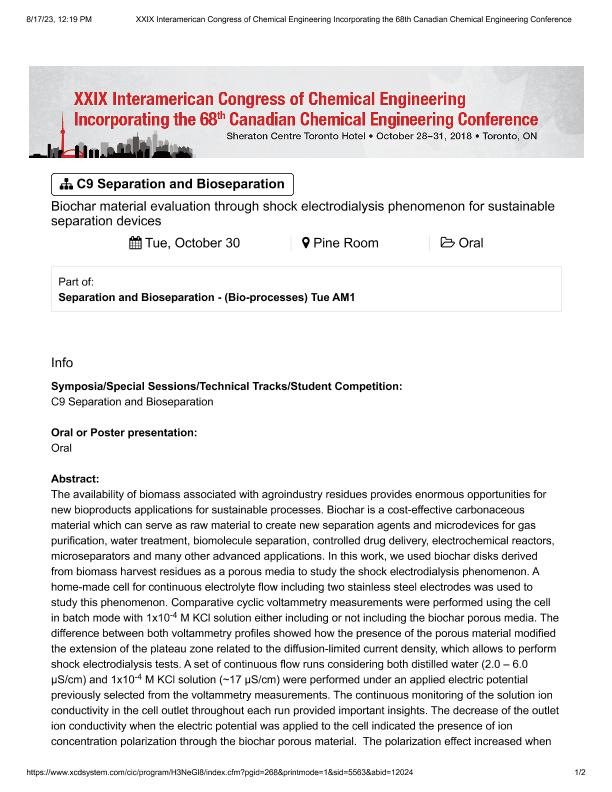Evento
Biochar material evaluation through shock electrodialysis phenomenon for sustainable separation devices
Montes, Paula; Antunez, Camila; Trujillo, Matías; Iglesias, Gabriela; Trejo González, José Adolfo ; Madrid, Rossana Elena
; Madrid, Rossana Elena ; Avila, Adolfo María
; Avila, Adolfo María
 ; Madrid, Rossana Elena
; Madrid, Rossana Elena ; Avila, Adolfo María
; Avila, Adolfo María
Tipo del evento:
Congreso
Nombre del evento:
XXIX Interamerican Congress of Chemical Engineering
Fecha del evento:
28/10/2018
Institución Organizadora:
Canadian Society for Chemical Engineering;
Título del Libro:
Abstracts of the XXIX Interamerican Congress of Chemical Engineering
Editorial:
Chemical Institute of Canada
Idioma:
Inglés
Clasificación temática:
Resumen
The availability of biomass associated with agroindustry residues provides enormous opportunities for new bioproducts applications for sustainable processes. Biochar is a cost-effective carbonaceous material which can serve as raw material to create new separation agents and microdevices for gas purification, water treatment, biomolecule separation, controlled drug delivery, electrochemical reactors, microseparators and many other advanced applications. In this work, we used biochar disks derived from biomass harvest residues as a porous media to study the shock electrodialysis phenomenon. A home-made cell for continuous electrolyte flow including two stainless steel electrodes was used to study this phenomenon. Comparative cyclic voltammetry measurements were performed using the cell in batch mode with 1x10-4 M KCl solution either including or not including the biochar porous media. The difference between both voltammetry profiles showed how the presence of the porous material modified the extension of the plateau zone related to the diffusion-limited current density, which allows to perform shock electrodialysis tests. A set of continuous flow runs considering both distilled water (2.0 ? 6.0 µS/cm) and 1x10-4 M KCl solution (~17 µS/cm) were performed under an applied electric potential previously selected from the voltammetry measurements. The continuous monitoring of the solution ion conductivity in the cell outlet throughout each run provided important insights. The decrease of the outlet ion conductivity when the electric potential was applied to the cell indicated the presence of ion concentration polarization through the biochar porous material. The polarization effect increased when flow velocities and electrolyte concentrations were lower. With a proper engineering design (geometry, thickness and morphology) and considering optimized operating conditions (flow rate, applied voltage and ion concentration), this cost-effective carbonaceous material may play an important role in the development of new separation technologies for water treatment.
Palabras clave:
Biochar
,
Shock electrodialysis
,
Desalination
,
Polarization
Archivos asociados
Licencia
Identificadores
Colecciones
Eventos(INQUINOA)
Eventos de INST.DE QUIMICA DEL NOROESTE
Eventos de INST.DE QUIMICA DEL NOROESTE
Citación
Biochar material evaluation through shock electrodialysis phenomenon for sustainable separation devices; XXIX Interamerican Congress of Chemical Engineering; Toronto; Canadá; 2018; 1-2
Compartir



